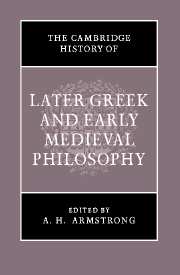Book contents
- Frontmatter
- Chapter 1 Introductory
- Part 1 GREEK PHILOSOPHY FROM PLATO TO PLOTINUS
- Part II PHILO AND THE BEGINNINGS OF CHRISTIAN THOUGHT
- Part III PLOTINUS
- Part IV THE LATER NEOPLATONISTS
- Part V MARIUS VICTORINUS AND AUGUSTINE
- Part VI THE GREEK CHRISTIAN PLATONIST TRADITION FROM THE CAPPADOCIANS TO MAXIMUS AND ERIUGENA
- Chapter 28 Introduction: Greek Christian Platonism
- Chapter 29 The Cappadocians
- Chapter 30 The pseudo-Dionysius
- Chapter 31 The reaction against Proclus
- Chapter 32 St Maximus the Confessor
- Chapter 33 The Philosophy of Icons
- Chapter 34 Johannes Scottus Eriugena
- Part VII WESTERN CHRISTIAN THOUGHT FROM BOETHIUS TO ANSELM
- Part VIII EARLY ISLAMIC PHILOSOPHY
- Select Bibliography
- Additional Notes and Bibliography
- Index of ancient and medieval works referred to in the text
- General Index
- Index of Greek terms
- References
Chapter 31 - The reaction against Proclus
from Part VI - THE GREEK CHRISTIAN PLATONIST TRADITION FROM THE CAPPADOCIANS TO MAXIMUS AND ERIUGENA
Published online by Cambridge University Press: 28 March 2008
- Frontmatter
- Chapter 1 Introductory
- Part 1 GREEK PHILOSOPHY FROM PLATO TO PLOTINUS
- Part II PHILO AND THE BEGINNINGS OF CHRISTIAN THOUGHT
- Part III PLOTINUS
- Part IV THE LATER NEOPLATONISTS
- Part V MARIUS VICTORINUS AND AUGUSTINE
- Part VI THE GREEK CHRISTIAN PLATONIST TRADITION FROM THE CAPPADOCIANS TO MAXIMUS AND ERIUGENA
- Chapter 28 Introduction: Greek Christian Platonism
- Chapter 29 The Cappadocians
- Chapter 30 The pseudo-Dionysius
- Chapter 31 The reaction against Proclus
- Chapter 32 St Maximus the Confessor
- Chapter 33 The Philosophy of Icons
- Chapter 34 Johannes Scottus Eriugena
- Part VII WESTERN CHRISTIAN THOUGHT FROM BOETHIUS TO ANSELM
- Part VIII EARLY ISLAMIC PHILOSOPHY
- Select Bibliography
- Additional Notes and Bibliography
- Index of ancient and medieval works referred to in the text
- General Index
- Index of Greek terms
- References
Summary
John of Scythopolis
No attempt is here made to intervene in the apparently interminable debate as to who the ps.-Dionysius was and when he lived, though this must have been later than the Cappadocians, some of whose notions he developed, and before 528, the latest possible date for the first historical reference to his writings. Obviously he had both Christian and Platonist sympathies, though it is difficult to assess their relative weight. It is probably safe to say that he was a Christian philosopher who presented his beliefs in terms of the contemporary Neoplatonism both because it had a strong appeal for him and because these beliefs could best be defended by turning the arguments of what he considered the most satisfactory of the rival philosophies against itself.
In this, his position was not unlike that of St Gregory of Nyssa: but the Neoplatonism of Gregory was that of Plotinus while the Neoplatonism of the ps.-Dionysius was that of Proclus. The trend from the one to the other was a deviation in the direction contrary to Christianism, and the ambiguities of the ps.-Dionysius are the symptoms of a tension between Christianism and Platonism that was nearing breaking point. This was felt at once. No sooner had the Corpus Dionysianum been made public than commentators leapt to the task of defending not only its genuineness, but also its orthodoxy. In the first half of the sixth century commentaries were written by John and George of Scythopolis, by St Maximus in the seventh, by Germanus I, Patriarch of Constantinople in the eighth, and by other anonymous commentators who belong to these three centuries.
- Type
- Chapter
- Information
- Publisher: Cambridge University PressPrint publication year: 1967



